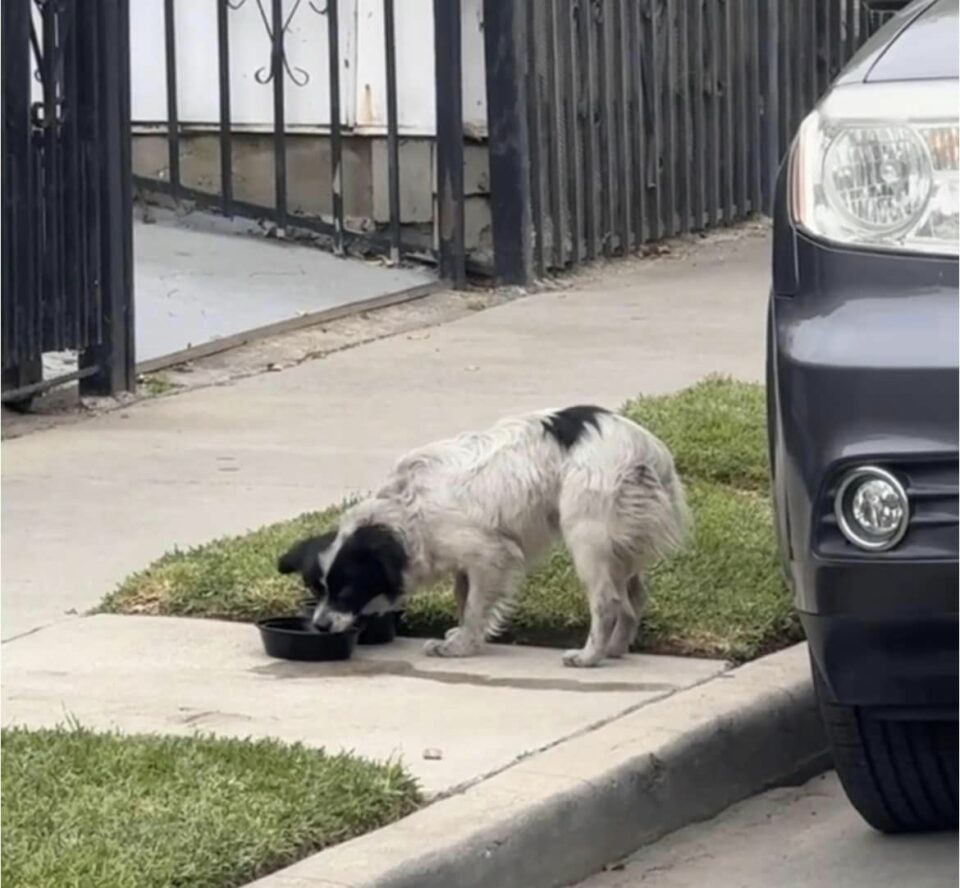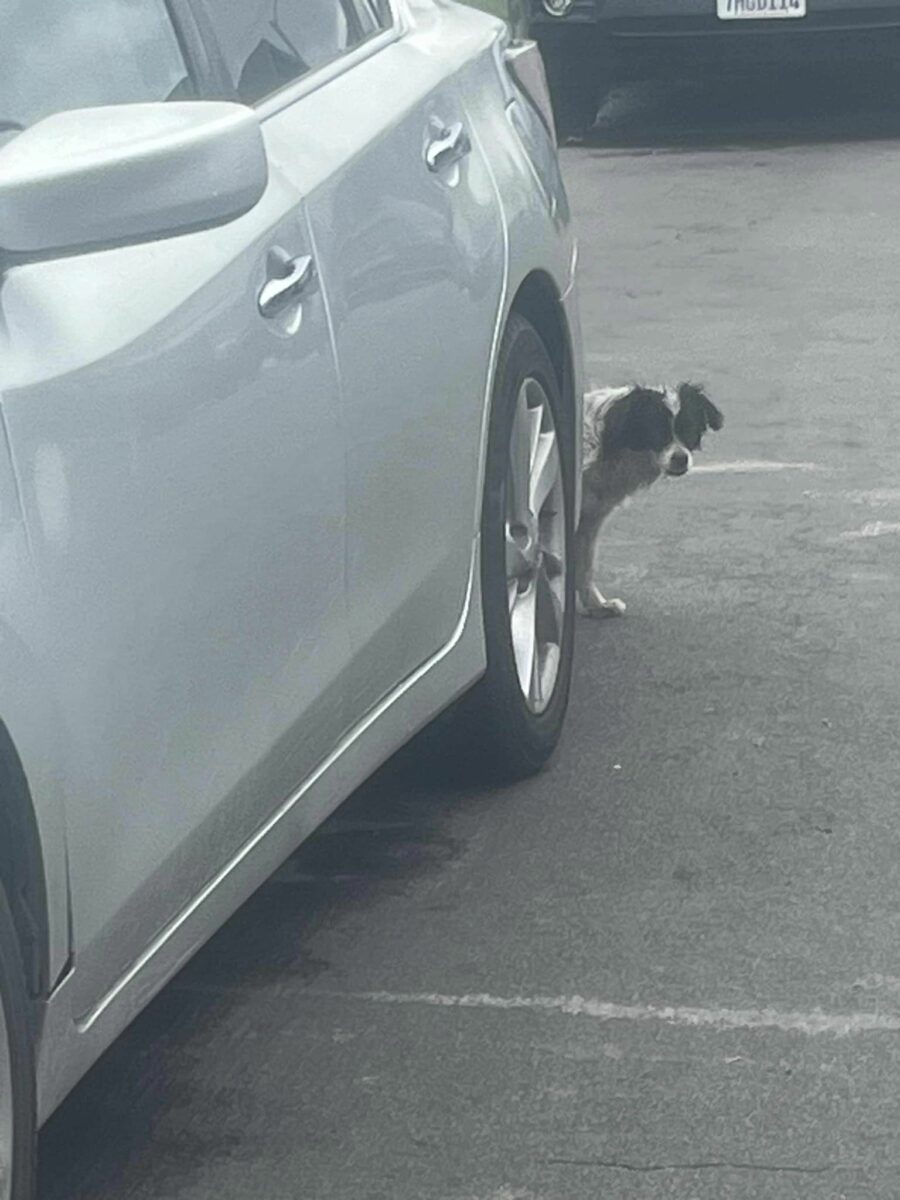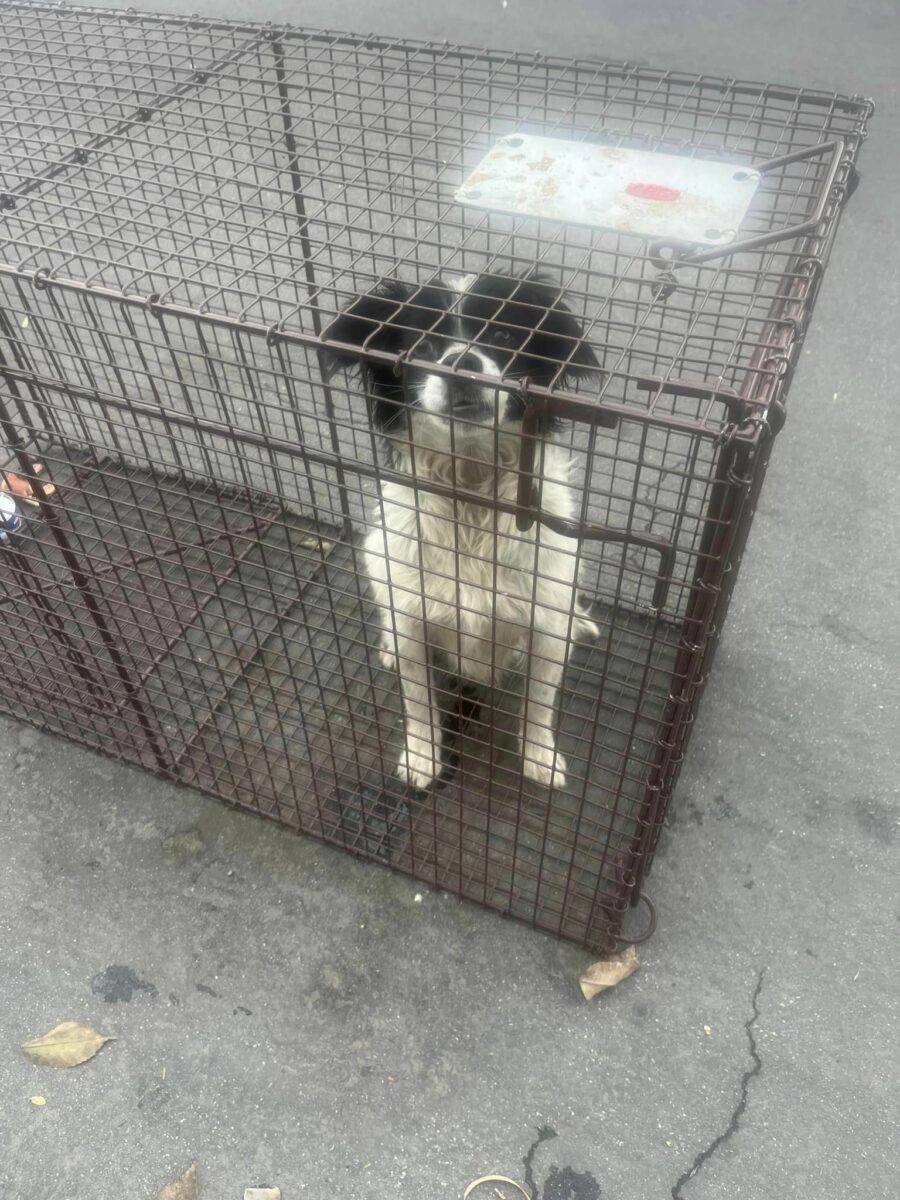Too often, I have seen a case where somebody just coldheartedly abandoned a dog and it’s always so depressing to see.
This would be enough to make anyone believe that the world really can’t change and that this treatment of dogs will continue like this.
However, that’s not the case. Even though it’s hard to see through the negativity, there is a light at the end of the tunnel.
So many rescuers work diligently every day to make sure that all dogs they find are saved and find a new home. They make the world a better place.
For Suzette Hall, it was just an ordinary day when she received a call about a dog who had been spotted near a busy street and needed help.
She Rushed To His Aid

After the poor pup had been dumped by his owner on a street in California, he tried his best to survive, but he was constantly in danger.
There was a strong possibility that he could get injured if he tried to run across the road, and food was very scarce.
A kind person gave him food which kept him going for a while, but he needed help. He had to sleep near the trash cans and imaging that is just heartbreaking.

The whole time, the dog just waited in hopes that his owner would come back and take him home, but that was never going to happen.
I just don’t understand the people who could do something like this to an innocent dog. He didn’t do anything to deserve this.
Regardless, things were about to change when Suzette Hall finally came to his location and decided to help.
A Humane Trap For The Dog

When she tried to help him, he was a bit timid and slowly moved away from his rescuer. However, Hall decided to put a trap in place.
A friend of hers bought some food, put it in the kennel, and waited until the dog took the bait.
He didn’t know if these people meant well, but he was really hungry and couldn’t say no to free food.
So, he went for the trap to eat the hot dogs they bought, and he was finally secured. Hall breathed a sigh of relief, knowing that he was now safe.

She placed him in her vehicle and they were now on their way to the shelter in California. Hall noted that they were lucky to save him when they did because it started pouring soon after.
Now that he has settled in his temporary residence, Hall realized that he had to be taken to a vet soon for a checkup.
While we don’t know what happens next, we can safely assume that the dog has no real health problems and is going to recover completely.
As long as he is with Suzette Hall, there is no doubt that he will change for the better and find a forever home. I am so glad that she saved him.
If you’ve ever wondered about the unwavering loyalty of our furry companions, you’re not alone. Dogs, with their endearing wagging tails and soulful eyes, seem to have an innate ability to form deep bonds with their human counterparts. As a seasoned dog trainer, I’ve witnessed firsthand the remarkable loyalty that dogs exhibit, often going above and beyond to show their devotion.
From eagerly greeting you at the door after a long day to standing by your side through thick and thin, dogs have a unique way of making us feel special. Their loyalty knows no bounds, creating a bond that transcends words and is truly heartwarming. In this article, we’ll explore the fascinating reasons behind why dogs are so incredibly loyal, shedding light on the remarkable connection between humans and our four-legged friends.
Exploring the History of Canine Loyalty
Dogs as Human Companions Through the Ages
Traveling back in time, dogs have been our loyal companions for centuries. From hunting partners to faithful protectors, dogs have played diverse roles in human history. Their companionship has grown stronger over the years, evolving into a bond characterized by trust, companionship, and unwavering loyalty.
Evolution of the Human-Dog Bond
The relationship between humans and dogs has deepened over time, transcending mere utility to emotional connection. As humans domesticated dogs, a unique bond formed, rooted in mutual respect and companionship. This evolution shaped dogs into more than just helpers; they became beloved members of our families, showcasing loyalty and devotion that touch our hearts.
Examining the Science Behind Canine Loyalty
Genetic Factors Influencing Dog Behavior
Genetics plays a significant role in shaping a dog’s behavior, including their loyalty towards humans. Studies have shown that specific genes in dogs are associated with social behavior and attachment to their owners. These genetic predispositions can influence how dogs bond with their human companions and exhibit loyalty in various situations.
The Role of Oxytocin in Dog-Human Relationships
Oxytocin, often referred to as the “love hormone,” is a key player in fostering the bond between dogs and humans. When dogs interact with their owners through activities like petting, gazing, or playing, oxytocin levels increase in both the dog and the human. This hormonal response enhances feelings of trust, bonding, and loyalty, strengthening the emotional connection between dogs and their human caregivers.
How Dogs Show Their Loyalty
Protective Instincts and Behavior
Dogs demonstrate their loyalty through their protective instincts, often seen in their behaviors towards their human family. They naturally form a strong bond and will go to great lengths to protect their loved ones, whether it’s barking at strangers to alert their owners or standing guard to ensure their family’s safety.
Emotional Support and Unconditional Love
Another way dogs show their loyalty is through emotional support and unconditional love. They have an innate ability to sense human emotions, providing comfort during difficult times and celebrating joyous moments with wagging tails and affectionate licks. Their unwavering companionship and constant presence create a deep emotional bond built on trust and love.
Dogs display their loyalty in various ways, including their protective instincts, emotional support, and unconditional love. These qualities showcase the profound connection and bond they share with their human companions, making them cherished members of the family.
Factors That Enhance a Dog’s Loyalty
Training and Positive Reinforcement
To strengthen your dog’s loyalty, consistent training and positive reinforcement are key. By teaching your dog basic commands and rewarding good behavior, you establish a clear communication channel and build trust. Dogs thrive on positive reinforcement, such as treats or praise, which helps reinforce their loyalty to you as their caregiver.
The Importance of Socialization
Socializing your dog from a young age is crucial for fostering loyalty. By exposing your dog to various environments, people, and other animals, you help them feel more secure and confident in different situations. This socialization process builds resilience and trust in your relationship, leading to a stronger bond based on mutual understanding and familiarity.
Human Behavior and Its Impact on Loyalty
Your behavior towards your dog significantly influences their loyalty. Dogs are highly attuned to human emotions and responses. By consistently showing them love, care, and respect, you reinforce their loyalty towards you. Your actions, such as spending quality time together, meeting their needs, and providing a safe environment, reinforce the emotional connection and trust your dog has in you.
The completion of the section on Factors That Enhance a Dog’s Loyalty provides insights into the essential aspects that strengthen the bond between dogs and their human companions. By focusing on training and positive reinforcement, socialization, and your behavior towards your dog, you can enhance their loyalty, fostering a deeper connection built on trust and mutual respect.
Debunking Myths About Dog Loyalty
Loyalty vs. Dependence: Understanding the Difference
Loyalty and dependence are often mistaken for each other when it comes to dogs. Loyalty is the deep bond and allegiance a dog forms with its human, stemming from trust and companionship. It’s about loyalty to you as their special person. On the other hand, dependence refers to the reliance a dog may have on you for care and basic needs like food and shelter. Dogs can be both loyal and dependent, but loyalty is more about the emotional connection they share with you, built on love and companionship.
Are Certain Breeds Naturally More Loyal?
There isn’t a specific breed that is automatically more loyal than others. Loyalty in dogs is individual and can vary based on factors like training, socialization, and the bond developed with their human. While some breeds are known for being affectionate and dedicated, loyalty ultimately comes down to the individual dog and how they are raised and treated. Any breed, from the energetic Labrador Retriever to the regal German Shepherd, can exhibit profound loyalty when given the right environment and care.
Conclusion
Dogs’ loyalty is a remarkable trait deeply rooted in their history with humans. From being hunting partners to cherished companions, dogs have evolved to form strong emotional bonds with us. Loyalty goes beyond mere dependence; it’s about trust and companionship. Breed stereotypes don’t define loyalty; it’s about individual relationships, training, and socialization. Any dog, with love and care, can show profound loyalty. Remember, it’s the bond you nurture that truly matters in fostering a strong human-dog connection.
Frequently Asked Questions
Q: What are the historical roots of dogs’ loyalty towards humans?
A: Dogs’ loyalty towards humans traces back to their evolution as hunting partners, evolving into cherished companions over time.
Q: How has the human-dog bond transitioned over the years?
A: The bond between humans and dogs has shifted from utility to a deep emotional connection, influenced by factors like genetics and the release of oxytocin.
Q: What distinguishes loyalty from dependence in dogs?
A: Loyalty in dogs stems from a strong bond built on trust and companionship, while dependence refers to relying on humans for basic needs.
Q: Are certain dog breeds more inherently loyal than others?
A: Loyalty in dogs is individual and can be influenced by training, socialization, and the bond formed with their human, rather than being breed-specific.
Q: How can one foster loyalty in their dog?
A: Fostering loyalty in dogs involves providing love, care, and companionship, regardless of the breed, to nurture a strong human-dog bond.
[no_toc]

Hey there, I’m Janet Brooks, a dog-loving student from California. I’m all about helping pups in need, especially those without homes. Me and my awesome friends work together to give shelter and love to stray dogs. Oh, and I also write blogs about dogs to share helpful info.